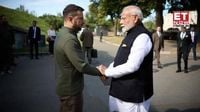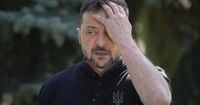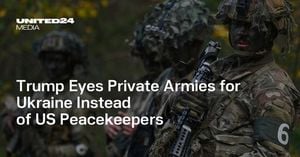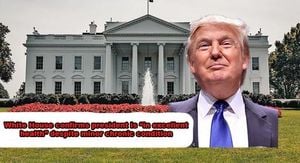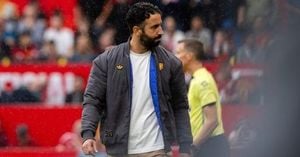In a week marked by fierce fighting and a flurry of diplomatic activity, Ukrainian President Volodymyr Zelenskyy and his government have intensified their push for international support to end the three-year war with Russia. As violence continues to claim civilian lives and Russia signals plans for a new offensive, Ukraine is seeking to rally allies from Washington to New Delhi, while Moscow insists on preconditions for any potential peace summit.
On August 29, 2025, Zelenskyy announced that Ukrainian officials are preparing to meet with U.S. President Donald Trump and European leaders the following week. The aim: to add momentum to the stalling peace process and respond to what Zelenskyy described as Russia’s lack of constructive engagement. According to the Associated Press, Zelenskyy said, “Leaders must urgently be involved to reach agreements,” expressing frustration with Moscow’s insistence that groundwork be completed by lower-level officials before any summit between himself and President Vladimir Putin.
This sense of urgency was underscored by the devastating Russian missile and drone attack on Ukraine overnight from August 29 to 30. The strikes killed at least 23 people, including four children, and wounded more than 50, with eight still unaccounted for. The Kyiv region declared an official day of mourning—flags flew at half-staff and all entertainment events were canceled as rescue workers searched the rubble. Interior Minister Ihor Klymenko reported that the youngest victim was just two years old, and some bodies had yet to be identified.
At an emergency session of the U.N. Security Council on August 29, the United States issued a stern warning to Russia: move toward peace and agree to talks with Ukraine or face the prospect of new sanctions. John Kelley, the U.S. mission’s minister-counselor, said the recent strikes “cast doubt on the seriousness of Russia’s desire for peace” and demanded they stop. He reiterated President Trump’s earlier warning that the U.S. could impose further sanctions if the war drags on.
Diplomatic efforts have been accelerating on multiple fronts. Andriy Yermak, the head of Ukraine’s presidential office, met in New York with Trump’s special envoy Steve Witkoff to discuss preparations for the upcoming meetings. Yermak emphasized the need for “real diplomacy” and implementation of agreements reached at the Washington summit. In a post on social media, he lamented, “Russia is failing to fulfill anything necessary to end the war and is clearly dragging out the hostilities.” He added, “Ukraine supports President Trump’s firm resolve, as well as that of all partners, to achieve a lasting peace as soon as possible. Ukraine welcomes all peace initiatives put forward by the United States. But unfortunately, each of them is being stalled by Russia.”
While Ukraine has accepted a U.S. proposal for a ceasefire and a potential meeting between Putin and Zelenskyy, Moscow has raised objections. Kremlin spokesperson Dmitry Peskov reiterated on August 29 that Putin “doesn’t rule out” such a meeting, but only after progress is made “at the expert level.” He told reporters, “A summit must be well prepared so that it can finalize the work that must first be carried out at the expert level. At this point we can’t say that the expert work is in full swing, so to speak. No, unfortunately, not. We maintain our interest and our readiness for these negotiations.”
Meanwhile, the violence on the ground shows no sign of abating. Russian General Valery Gerasimov announced on August 30 that the Russian armed forces are defining their tasks for an autumn offensive. He claimed that Russian forces now control 99.7% of Luhansk, 79% of Donetsk, 76% of Kherson, and 74% of Zaporizhzhya regions—figures that are impossible to independently verify. “The combined group of troops continues a nonstop offensive along almost the entire front line. The strategic initiative lies entirely with Russian forces,” Gerasimov asserted, as reported by Radio Free Europe/Radio Liberty.
Ukrainian military spokesman Viktor Trehubov pushed back on these claims, telling national TV that Ukrainian forces are having success holding back enemy troops in Donetsk and Dnipropetrovsk. “Despite its aggressive actions, despite success at some points in pressuring Ukrainian positions, Russia has scored no quick victories,” Trehubov said.
Zelenskyy has repeatedly accused Moscow of using diplomatic delays as cover to intensify attacks, and he has called for stronger sanctions—particularly targeting Russia’s banking and energy sectors. Ukrainian intelligence reports indicate that Russia is preparing a new offensive in eastern Ukraine, with some 100,000 troops concentrated near the strategic mining city of Pokrovsk. The need for more sophisticated Western air defense systems and a secure supply of weapons remains a top priority for Kyiv. Zelenskyy urged Western countries to consider secondary sanctions on nations trading with Russia, arguing that their economic ties help sustain Moscow’s war effort.
Internationally, Ukraine’s diplomatic push has reached beyond the West. On August 30, Zelenskyy briefed Indian Prime Minister Narendra Modi on the conflict and sought India’s role in peace talks ahead of the upcoming Shanghai Cooperation Organization (SCO) Summit. According to ET Now, Modi thanked Zelenskyy for the call and reiterated India’s “steadfast and consistent position” on seeking a peaceful settlement. Both leaders exchanged views on the conflict’s humanitarian impact and efforts to restore stability.
Peace efforts have also involved talks in Qatar, Saudi Arabia, Turkey, the United Arab Emirates, Switzerland, and the United States, as Ukrainian negotiators seek to build a broad coalition for a settlement. However, skepticism remains high among European leaders. German Chancellor Friedrich Merz remarked on August 30, “All efforts of the past weeks have been answered with an even more aggressive approach by this regime in Moscow against the population in Ukraine. This will also not stop until we ensure together that Russia, at least for economic reasons, and perhaps also for military reasons…can no longer continue this war.”
President Trump, in an interview with the Daily Caller, expressed skepticism about his ability to broker a direct meeting between Putin and Zelenskyy, though he considered a three-way meeting with himself included as still possible. Reflecting on his past interactions with Putin, Trump said, “We got along. You saw it, we’ve had a good relationship over the years, very good, actually. That’s why I really thought we would have this done. I would have loved to have had it done.”
Looking ahead, Putin is scheduled to attend a meeting in China from Sunday, alongside leaders from Iran and North Korea—countries the U.S. accuses of aiding Russia’s war effort. The ongoing conflict is expected to dominate the agenda at the U.N. General Assembly later in September. The Atlantic Council noted that recent U.S. presidents have avoided taking a tougher line with Putin, wary of nuclear escalation, and suggested that the Kremlin may doubt Washington’s willingness to fully confront Russian advances.
As the war grinds on, Ukraine’s government is betting that a combination of diplomatic pressure, international sanctions, and continued military resistance will eventually force Moscow to the negotiating table. For now, however, the path to peace remains fraught with obstacles, and the toll on Ukrainian civilians continues to mount.
